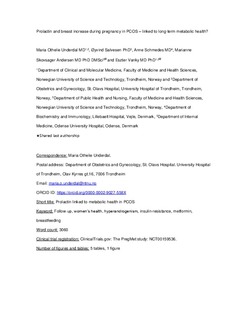| dc.contributor.author | Underdal, Maria Othelie | |
| dc.contributor.author | Vanky, Eszter | |
| dc.contributor.author | Andersen, Marianne Skovsager | |
| dc.contributor.author | Salvesen, Øyvind | |
| dc.contributor.author | Schmedes, Anne | |
| dc.date.accessioned | 2019-06-17T09:36:49Z | |
| dc.date.available | 2019-06-17T09:36:49Z | |
| dc.date.created | 2019-06-13T14:53:45Z | |
| dc.date.issued | 2019 | |
| dc.identifier.issn | 0804-4643 | |
| dc.identifier.uri | http://hdl.handle.net/11250/2600968 | |
| dc.description.abstract | Objective
To explore whether gestational prolactin and breast increase are markers of metabolic health in pregnancy and on long-term, in PCOS.
Design
Follow-up study. Women with PCOS, according to the Rotterdam criteria (n = 239), former participants of the randomized controlled trial (RCT) PregMet were invited, 131 participated in the current follow-up study, at mean 8 years after pregnancy.
Methods
Metformin 2000 mg/day or placebo from first trimester to delivery in the original RCT. No intervention in the current study.
Prolactin was analyzed in the first trimester and at gestational week 32 and metabolic characteristics which are part of the metabolic syndrome and measures of glucose homeostasis were examined. Metabolic health was also evaluated according to breast increase versus lack of breast increase during pregnancy.
Results
Prolactin increase in pregnancy was negatively correlated to BMI (P = 0.007) and systolic blood pressure (P ≤ 0.001) in gestational week 32. Prolactin at gestational week 32 was negatively correlated to BMI (P = 0.044) and visceral fat area (P = 0.028) at 8-year follow-up in an unadjusted model. Prolactin at gestational week 32 showed no associations to metabolic health at follow-up when baseline BMI was adjusted for. Women who reported lack of breast increase during pregnancy, had higher BMI (P = 0.034), waist-hip ratio (P = 0.004), visceral fat area (P = 0.050), total cholesterol (P = 0.022), systolic (P = 0.027) and diastolic blood pressure (P = 0.011) at 8-year follow-up.
Conclusion
High prolactin levels and breast increase in pregnancy were associated with a more favorable long-term metabolic health in women with PCOS. Both prolactin and breast increase may be mediated by gestational BMI. | nb_NO |
| dc.language.iso | eng | nb_NO |
| dc.publisher | BioScientifica | nb_NO |
| dc.title | Prolactin and breast increase during pregnancy in PCOS: linked to long-term metabolic health? | nb_NO |
| dc.type | Journal article | nb_NO |
| dc.type | Peer reviewed | nb_NO |
| dc.description.version | acceptedVersion | nb_NO |
| dc.source.journal | European Journal of Endocrinology | nb_NO |
| dc.identifier.doi | 10.1530/EJE-19-0002 | |
| dc.identifier.cristin | 1704709 | |
| dc.description.localcode | Locked until 1.6.2020 due to copyright restrictions. This is the peer reviewed version of an article, which has been published in final form at [https://doi.org/10.1530/EJE-19-0002]. | nb_NO |
| cristin.unitcode | 194,65,15,0 | |
| cristin.unitcode | 194,65,1,0 | |
| cristin.unitname | Institutt for klinisk og molekylær medisin | |
| cristin.unitname | MH fakultetsadministrasjon | |
| cristin.ispublished | true | |
| cristin.fulltext | postprint | |
| cristin.qualitycode | 2 | |
